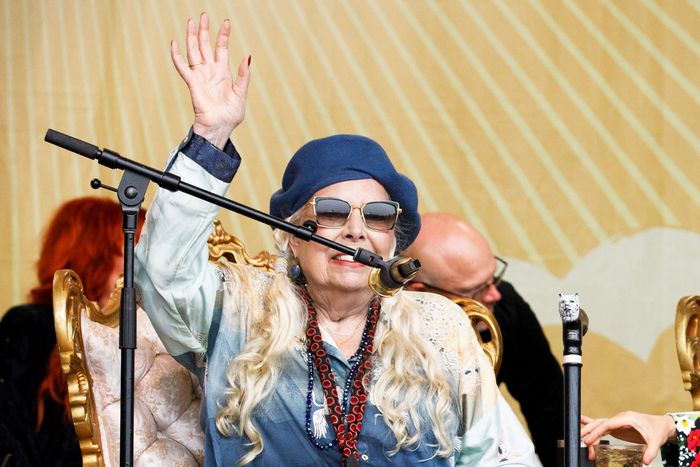
It feels silly to ask why it’s overwhelming to see Joni Mitchell performing in 2022. The question contains its own answer. It’s Joni Mitchell! Singing and playing again in front of a rapturous, weeping crowd at the Newport Folk Festival, after years of grave illness and nearly a decade since her last performance. “Overwhelming” is a given.
But there’s something about watching Mitchell singing “Both Sides Now” (along with Brandi Carlile, who has become the cultural Joni emissary in recent years) that goes beyond the usual short-lived exclamation mark and instead gets lodged somewhere in your gut. Many of Mitchell’s most famous songs are about time passing and how different the world can look from one year to the next. They are explicitly political works about a decade of upheaval that happened fifty years ago: songs that taught many of our mothers about feminism, that taught many of us about our mothers. So it’s tempting to imagine that watching Joni Mitchell in 2022 would feel like watching a time traveler sing about time traveling — “The Circle Game,” “Big Yellow Taxi,” “Both Sides Now.” You drag your feet to slow the circle down.
The performance from Newport is not that. Even as she’s surrounded by a stage full of people weeping and staring at her in adoration, it’s striking how much Mitchell does not feel like an antique from another era, present but clearly out of date. For one, Mitchell’s voice has changed enough that there’s no dislocating feeling of uncanny comparison. Her vocal approach is now entirely its own kind of performance, one that’s deeper, slower, and much weightier than earlier in her career. She is not reaching to get back to her young self; she’s reinterpreting those songs through who she has become.
Mitchell’s songs, and the way she performs them now, are cumulative. They only collect more associations and more meanings with time. The astounding leaps from breadth to intimacy in her work make it impossible to disentangle Mitchell’s music from everything else, from contemporary politics but also from your own breakup, your frustrations, your sense of self, your spinning awareness of getting older. So it’s just as impossible to watch Joni Mitchell performing in 2022 and not feel like that experience is also about everything else: COVID and the towering musical legends lost in the past few years, our own personal griefs, the end of Roe v. Wade, climate change, the settling sense of futility that’s begun to define the past decade in American history. Loneliness and longing. It would be intense to hear Mitchell perform under any circumstances, but right now it feels like an uninterrupted conduit to every good and powerful and terrible feeling of the past few years, everything that’s been too monumental to access any other way.
There’s a fitting, flower-child sentimentality to that image. In the middle of the world collapsing, there’s a lovely moment of art; an audience deprived of public mourning get a chance to feel connected to one another by an artist whose presence feels like a resurrection. And yet the most moving thing about Mitchell’s performance is so much simpler. She seems to be having a fantastic time. She begins dancing in her chair as “Big Yellow Taxi” starts playing. At the end of “Circle Game,” you can hear her saying, “That was so fun!” She’s smiling broadly while playing a guitar piece from Court and Spark, which is a skill Mitchell told CBS News that she forgot how to do after suffering a brain aneurysm and has had to relearn in recent years. It’s so poignant that singer Wynonna Judd sits behind Mitchell and weeps, possibly thinking about her own mother, who died earlier this year. We in the audience, or watching at home, may be in the middle of an emotional catharsis so overwhelming that our central nervous systems have stopped working. But Joni knows that and is loving it, and she knows that the music lives up to what she wants it to be. “I want to be good,” Mitchell said after the performance. “And I wasn’t sure I could be. But I didn’t sound too bad tonight!”


